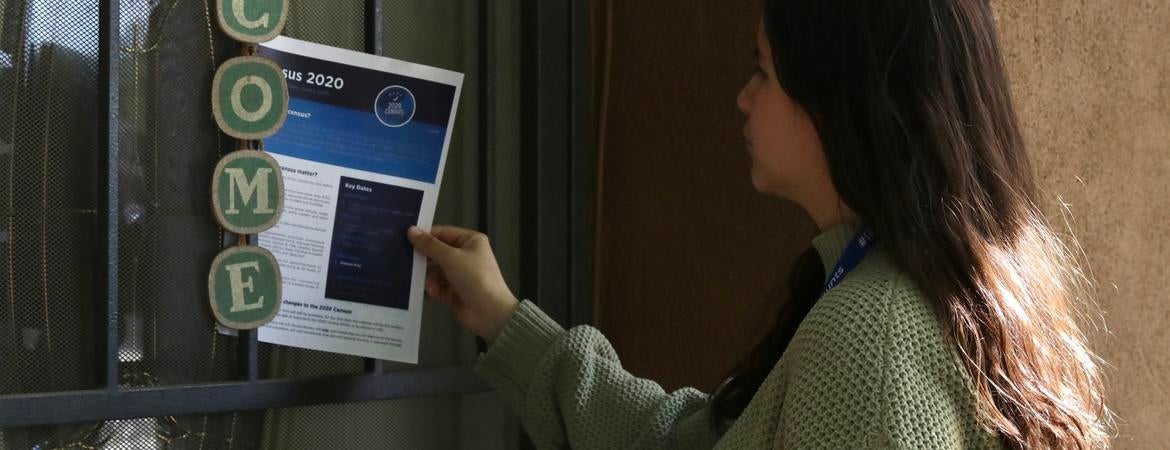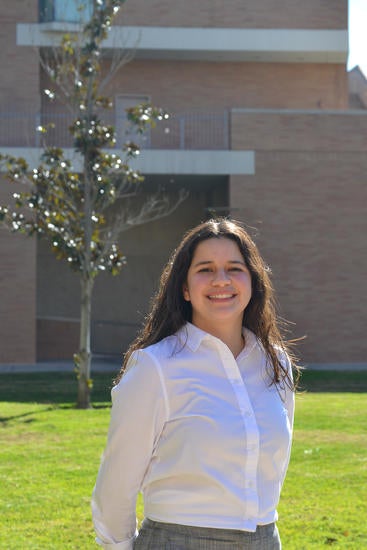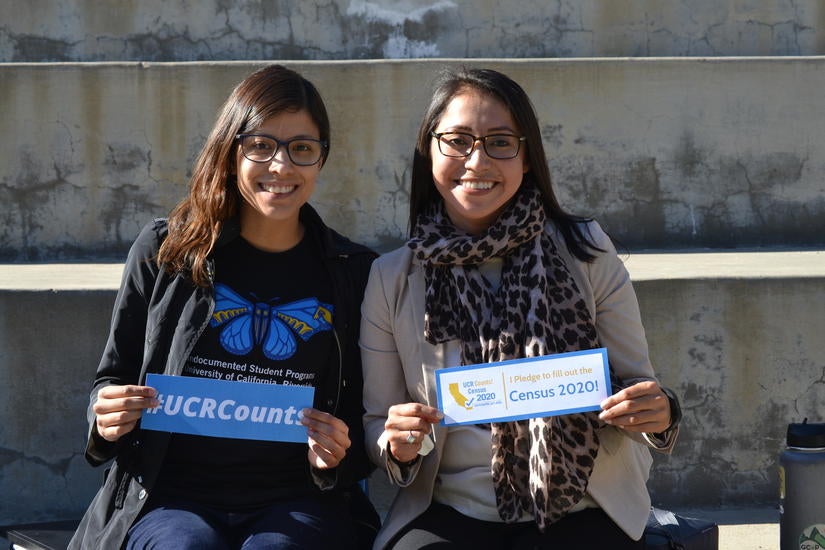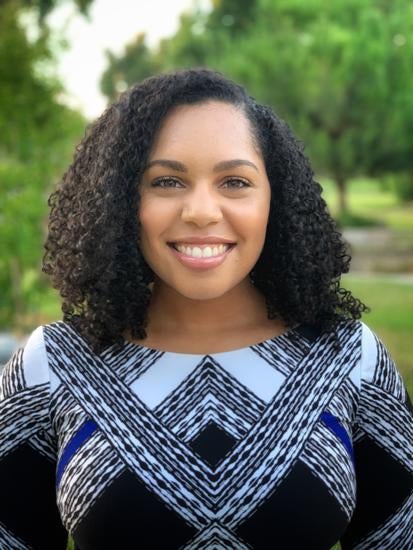
Tamara Marquez didn’t know much about the U.S. census before last year, when she applied for a job as a canvasser with the Center for Community Action and Environmental Justice, a nonprofit organization based in Jurupa Valley.
Marquez, a senior at the University of California, Riverside, is forthcoming about why she wanted the job. Originally from Mexico City, she immigrated to the U.S. as a child and remains undocumented, which limits her employment opportunities.
She also admits she didn’t know much about canvassing, going door to door to talk to people about why, exactly, they should care enough about the census to fill it out.
Between November and March, Marquez spent as many as six days per week canvassing in Riverside, later alternating door-to-door sessions with phone banking. At first, she said, talking to strangers was intimidating — especially when they didn’t want to hear what she had to say.
“But you learn pretty quickly to change your script depending on who you’re talking to,” Marquez said. “If you’re talking to a Spanish-speaking household, a family with kids, you might tell them about how the census can affect schools. You’re trying to convince people, so you start by feeling out the environment to figure out which strategies to implement.”
A 10-year count
Every 10 years, the U.S. conducts a nationwide population count known as the decennial census. It’s important for two main reasons: First, census data dictates how many seats states receive in the U.S. House of Representatives and is used to draw congressional and state legislative districts.
It also helps determine how federal funding is allocated to state and local governments for programs such as Medicaid and the Supplemental Nutrition Assistance Program, or SNAP.
Accurate census representation is critical for UCR students because it informs funding for things like Pell Grants, the Federal Work-Study Program, and research activities, said Marlenee Blas.
Blas is the associate director of UCR’s Center for Social Innovation, and since October has served as director of UCR Counts, the university’s official Complete Count Committee. An initiative of the U.S. Census Bureau, the Complete Count Committees program is key to creating census awareness in communities nationwide through targeted outreach efforts.
UCR Counts is situated within a regional network that also incorporates two county governments and about 80 nonprofits, Blas said — all of which have united in an unprecedented effort to ensure the Inland Empire is accurately counted.
The two-county region’s more than 4.6 million people are at dangerous risk of being undercounted, a trend reflected in the 2010 census. That year, nearly one in four Inland Empire households didn’t mail back their census questionnaire; another 40,000 people didn’t receive one at all.
A substantial portion of the region’s residents are part of “hard-to-count” communities, which include undocumented immigrants, non-English speakers and households, and racial and ethnic minorities, among other groups.
“One major challenge for county and government agencies is that there is little trust and therefore census messages aren’t so well-received,” Blas said. “This makes the role of nonprofit partners and educators — traditionally seen as trusted messengers — more important than ever.”
Adding to the mistrust is the proposed inclusion of a citizenship question, which the Trump administration called for last year.
The topic of citizenship hasn’t been included in a U.S. census since 1950, and it’s not part of the 2020 census, which features just nine demographic questions about respondents and the people they live with.
But Marquez said undocumented communities, in particular, are still likely to view participating in the census as a risk, namely because they fear public data about their communities being weaponized by law-enforcement agencies such as U.S. Immigration and Customs Enforcement, or ICE.
“Taking the census is a risk for undocumented people, but many just have to be informed about the benefits,” she said. “In my experience, the Hispanic households we’ve spoken with are the ones who are most ready to learn and be active. Immigrants already do so much for our communities, and the lack of a citizenship question allows immigrants not only to participate but to continue to help by making sure we all get the resources we need.”
The ability to “be seen” by their government is a large part of what makes the census appealing to many undocumented people, Marquez said.
“For undocumented communities, a lot of it is about more resources and more opportunities because we’re typically overlooked, and this is one of our few chances to actually count,” she said.
The Inland Empire rises
Blas said Inland Empire census activities have had a collateral benefit of bringing together people from different nonprofits and other organizations, allowing many to begin interacting with each other for the first time.
“The census has created a new infrastructure and enabled the stitching of a network,” she said.
The nonprofit Inland Empire Community Foundation is largely leading the efforts. The foundation was designated an administrative community-based organization, or ACBO, by the state, and thus given funding to drive outreach in hard-to-count communities within the region.
In 2019, the foundation launched Census IE, a coalition of nonprofit and community-based organizations within Riverside and San Bernardino counties, and began to distribute funding to those organizations. It’s divided the Inland Empire into seven subregions, with a regional coordinator assigned to each.
The Center for Community Action and Environmental Justice, which Marquez works with as a canvasser, is the regional coordinator for the Riverside metropolitan area, where more than a quarter of the total population — nearly 696,000 people — lives in hard-to-count tracts.
But that’s just one arm of the outreach efforts.
There’s also IE Counts, the region’s official Complete Count Committee. This leadership body is overseen by Karthick Ramakrishnan, founding director of the Center for Social Innovation and a UCR professor of public policy and political science, and governed by county supervisors and representatives from the nonprofit, education, business, and philanthropic sectors.
The patchwork of initiatives has made major gains in the region since ramping up efforts last year. As of March, Census IE canvassers had knocked on more than 130,000 doors in the region. According to Blas, the efforts have paved the way for a new generation of civic leadership in the Inland Empire.
“At the regional level, most of these efforts are being led by young women, many of them Latina,” she said. “They’re truly at the forefront, and because many of them were born and grew up here, the census is a personal project. And because so much is at stake, they’re able to call other people out and hold them accountable. They’re asking questions that matter: ‘Why is money being allocated here and not here?’”
One of those women is Sky Allen, an Upland native who graduated from UCR in 2018.
Allen, who majored in business, said she was inspired to become more civically engaged after the 2016 presidential election. After graduating, she joined the Center for Social Innovation’s IE Nonprofit Fellowship Program, serving with the Warehouse Worker Resource Center.
Allen is now the census coordinator for Inland Empowerment, a regional partnership of nonprofit organizations that’s providing technical support for Census IE.
“A lot of my role is about making sure our different Inland Empire subregions stay in contact with each other to ensure the information we have is getting out to the public,” she said.
“So much of this infrastructure didn’t previously exist — between the dozens of nonprofit organizations and county governments and industry — so we’ve really had to create it. But I’d say it’s been more of an opportunity for our region than a challenge.”
Will the census prevail?
Now, the census finds itself facing another hurdle: a global pandemic, which has dramatically altered how outreach workers operate. In-person events and door-to-door canvassing have both been sidelined, with efforts mostly shifting to phone banking, texting, and social media promotion.
For the first time, the U.S. Census Bureau is asking most people to complete the census online, which could be a boon for participation. But Wi-Fi isn’t always easy to come by in hard-to-count communities, Allen said, so the objective is to reach people where they are with a range of techniques, from billboards to bus advertisements.
Overall, most people involved in census outreach efforts agree it’s still too early to tell how COVID-19 might affect participation. But one thing most of them are certain of is that it’s time for the census to be treated with the same respect as voting.
“People don’t realize the census is just as important as voting, and the census happens a lot less frequently than elections do,” Marquez said. “Participating in the census this one time will shape the future of Riverside and this region for the next 10 years — that’s a lot of power. How many billions of dollars will be allocated to Medicaid, to schools, to all these things we all use?”
Allen said she thinks the census mostly suffers from a lack of awareness about what it’s used for, which can make it feel less personal than voting. Talking about things like political representation and funding for communities also isn’t as buzzy because it can’t be sensationalized like an election can, she said.
Yet the census, unlike voting, is especially crucial because it includes everybody, she noted. There’s no eligibility threshold Americans must meet to participate, and everyone is expected to take part.
“It’s so important that we step up and take ownership of our communities,” she said. “We have to let them know we’re here, so we can get a piece.”
Take the 2020 census before Aug. 14 by clicking here. More information for UCR students — including how to be counted if you live on or off campus — can be found here.






